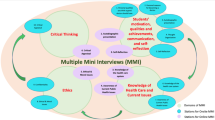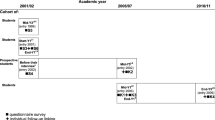Abstract
Purpose
This study’s purpose was to determine if there was a meaningful association between the multiple mini-interview (MMI) scores of students admitted to a US medical school and their subsequent performance during the basic science component of the curriculum which relies heavily on problem-based learning (PBL).
Methods
The authors used data from the matriculating classes of 2010–2012 (n = 125). Collected data included student MMI scores, highest MCAT score, undergraduate GPA, and demographics. The authors correlated MMI scores with PBL ratings using the Sequenced Performance Inventory and Reflective Assessment of Learning (SPIRAL), a modified version of a small group scoring rubric. The authors analyzed the data using Pearson’s correlation coefficient.
Results
The authors found significant positive correlations between the MMI and 12 of the 14 SPIRAL factors. The correlation between the MMI score and the average of the 14 SPIRAL factor ratings was 0.325 (p < 0.01). The authors found no significant correlations between the MMI score and MCAT scores, GPA, age, or gender.
Conclusions
Previous studies have reported on the predictive validity of the multiple mini-interview (MMI) process regarding non-cognitive learning aspects and teamwork dynamics. Our findings lend support to the growing MMI literature by showing that the MMI model is associated with aspects of small group learning. The MMI is a valued part of this school’s admissions process for selecting students who may be more successful in learning activities involving groups. Other schools of medicine may find the MMI to be a valuable addition to their admissions process for assessing non-cognitive skills.

Similar content being viewed by others
References
Kreiter CD, Yin P, Solow C, Brennan RL. Investigating the reliability of the medical school admissions interview. Adv Health Sci Educ. 2004;9:147–51.
Lemay JF, Lockyer JM, Colin VT, Brownell AK. Assessment of non-cognitive traits through the admissions multiple-mini interview. Med Educ. 2007;41(6):573–9.
Salvatori P. Reliability and validity of admissions tools to select students for health professions. Adv Health Sci Educ. 2001;65:159–75.
Institute of Medicine. To err is human: building a safer health system. Washington, DC: National Academies Press; 1999.
Institute of Medicine. Health professions education: a bridge to quality. Washington, DC: National Academies Press; 2003.
Knorr M, Hissbach J. Multiple-mini interviews: same concept, different approaches. Med Educ. 2014;48:1157–75.
US Medical Schools currently using MMI: Albany Medical College, Central Michigan University College of Medicine, Cooper/Rowan School of Medicine, Duke University School of Medicine, Michigan State University College of Human Medicine, New York Medical College, Oregon Health and Science University, Rutgers Robert Wood Johnson Medical School, Stanford Medical School, UCLA Prime, UCLA/David Geffen School of Medicine, Universidad Central del Caribe School of Medicine, University of Arizona College of Medicine, University of Arizona College of Medicine – Phoenix, University of California Davis School of Medicine, University of California Riverside School of Medicine, University of Cincinnati College of Medicine, University of Massachusetts Medical School, University of Mississippi School of Medicine, University of Missouri-Kansas City School of Medicine, Virginia Tech Carilion School of Medicine, Western Michigan University School of Medicine. http://admit2med.com/us-medical-schools-that-use-mmi-interview/. Accessed 29 Apr 2015.
Donnon T, Oddone PE, Violato C. The predictive validity of the MCAT for medical school performance and medical board licensing examinations: a meta-analysis of the published research. Acad Med. 2007;82:100–6.
Eva KW, Reiter HI, Rosenfeld J, Norman GR. The ability of the multiple-mini interview to predict pre-clerkship performance in medical school. Acad Med. 2004;79(10 suppl):S40–2.
Eva KW, Rosenfeld J, Reiter HI, Norman GR. An admissions OSCE: the multiple-mini interview. Med Educ. 2004;38:314–26.
Eva KW, Reitner HI, Rosenfeld J, Trinh K, Wood TJ, Norman GR. Association between a medical school admission process and national licensing examination scores. JAMA. 2012;308(21):2233–40.
Eva KW, Reitner HI, Trinh K, Wasi P, Rosenfeld J, Norman GR. Predictive validity of the multiple mini interview for selecting medical trainees. Med Educ. 2009;43:767–75.
Jerant A, Griffen E, Rainwater J, Henderson M, Sousa F, Bertakis KD, et al. Does applicant personality influence MMI performances and medical school offers. Acad Med. 2012;87(9):1250–9.
Griffin B, Hu W. The interaction of socio-economic status and gender in widening participation in medicine. Med Educ. 2015;49:103–13.
Lerner S, Magrane D, Friedman E. Teaching teamwork in medical education. Mt Sinai J Med. 2009;76:318–29.
Chakraborti C, Boonyasal R, Wright S, Kern D. A systematic review of teamwork training interventions in medical student and resident education. J Gen Intern Med. 2008;23(6):846–53.
Dolmans D, Michaelsen L, Van Merrieboer J, Van der Vleuten C. Should we choose between problem-based learning and team-based learning? No, combine the best of both worlds! Med Teach. 2015;37(4):354–9.
Olson L, Schieve AD, Ruit KG, Vari RC. Measuring inter-rater reliability of the Sequenced Performance Inventory and Reflective Assessment of Learning (SPIRAL). Acad Med. 2003;78(8):844–50.
Author information
Authors and Affiliations
Corresponding author
Rights and permissions
About this article
Cite this article
Pline, E.R., Whicker, S.A., Fogel, S. et al. Association of Multiple Mini-Interview Scores with First Year Medical Student Success in Problem-Based Learning. Med.Sci.Educ. 26, 221–227 (2016). https://doi.org/10.1007/s40670-016-0237-8
Published:
Issue Date:
DOI: https://doi.org/10.1007/s40670-016-0237-8




